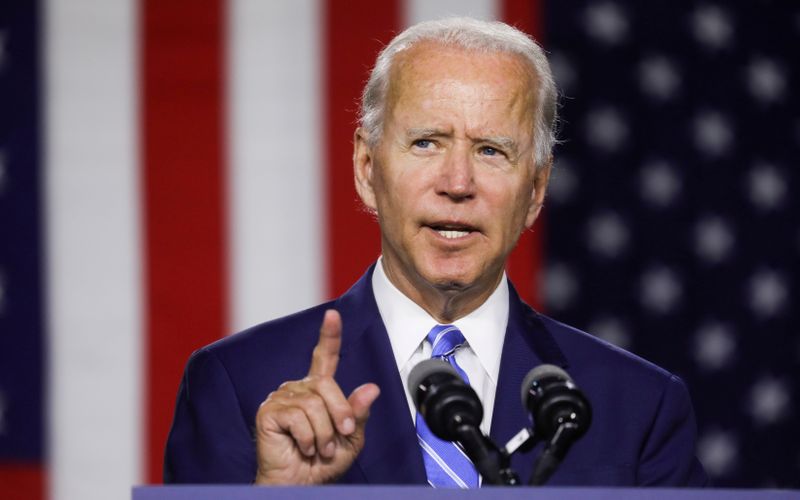By Geoffrey Smith
Investing.com -- Joe Biden picks Kamala Harris as running mate. Bond yields and the dollar rise ahead of the release of consumer price inflation data for July and a big 10-year note sale later. The U.K. had the worst contraction of all G7 countries in the second quarter, but sterling isn't fazed. And oil prices recover on the back of a strong set of inventory numbers, with more of the same from the EIA to come, as well as OPEC's monthly report. Here's what you need to know in financial markets on Wednesday, August 12th.
1, Dollar, Treasury yields rise ahead of big 10-year note sale, CPI
The dollar hit its highest level in two weeks and U.S. 10-year Treasury yields hit their highest in over a month, while Gold Futures stabilized after their 5% drop on Tuesday.
The rise in 10-year yields came ahead of a big auction of notes due at 1 PM ET (1700 GMT) that will provide a stiff test of the market’s ability to satisfy the borrowing demands of a government whose deficit has more than doubled from a year earlier.
By 6:30 AM ET, the benchmark 10-year note yielded 0.66%, just off its intraday high and a full 16 basis points above its lows of last week.
The rise in bond yields had been triggered by signs of higher-than-expected factory gate inflation in Tuesday’s PPI release. That suggests the market could be vulnerable to any negative surprises from the consumer price index for July that will be release at 8:30 AM ET. Last month’s 0.6% increase was the biggest monthly rise in seven years. Analysts expect a rise of 0.3% this month.
2. Biden picks Kamala Harris
The Democratic Party’s presidential candidate Joe Biden picked California Senator Kamala Harris as his running mate, in a move that appeared to shore up support among women and ethnic minorities, and to reassure centrist voters that the party’s progressive wing won’t have undue influence on policy if Biden is elected in November.
The choice of Harris, a former state attorney general, also arguably limits the vulnerability of Biden’s campaign to claims that it can’t defend law and order, a key campaign issue given the backdrop of widespread violence in Portland and other cities this summer.
Reports noted that Harris has been a big recipient of donations from Silicon Valley in the past, which may feed speculation that a Democratic administration may avoid confrontation with giants such as Facebook (NASDAQ:FB), Amazon (NASDAQ:AMZN) and Alphabet (NASDAQ:GOOGL) on antitrust issues.
3. Stocks set to rebound; Tesla's stock split, Tencent's earnings in focus
U.S. stock markets are set to open higher after Tuesday’s abrupt sell-off, when the rise in bond yields reintroduced the almost forgotten notion of discount rates back into stock valuations.
By 6:30 AM ET (1030 GMT), the Dow 30 futures contract was up 273 points, or 1.0%, while the S&P 500 futures contract was up 0.8% and the Nasdaq 100 contract was up 1.0%.
Stocks likely to be in focus in early trade include Tesla (NASDAQ:TSLA), which rose 6% in after-hours trading after the company announced a five-for-one stock split. Such a step makes no difference to the company’s market value by itself, but arguably supports it at the margins by broadening its appeal to smaller investors.
Also in focus will be Qualcomm (NASDAQ:QCOM), which won an important antitrust ruling on Tuesday, and Tencent Holdings (OTC:TCEHY), whose earnings easily outstripped expectations in the quarter, allaying fears of U.S. sanctions against its WeChat messaging system.
4. U.K. gets the biggest Covid-19 hit of all
The U.K. economy contracted by over 20% in the second quarter, the most of any major industrialized economy. The contraction was the result of a late and botched reaction to the first wave of the coronavirus, and also a reflection of the higher share of services in GDP relative to other economies.
Services have been particularly hard hit by lockdown measures and have also been slower to rebound.
Monthly data for June showed GDP, industrial production and construction output all recovering more quickly than expected, however. That limited losses in sterling against both the euro and dollar, while the two main U.K. stock indexes were mixed.
5. Oil bounces as inventory data support; OPEC report eyed
Crude oil prices rebounded from Tuesday’s lows, which were largely a function of developments in other assets.
By 6:30, U.S. crude futures were up 1.5% at $42.23 a barrel, while the international marker Brent was up 1.4% at $45.12 a barrel.
The market was underpinned by another reasonably strong set of numbers from the American Petroleum Institute on Tuesday, which indicated a 4.4 million-barrel draw in U.S. crude stocks last week, more than expected and enough to suggest the recovery in U.S. fuel demand is still intact.
The government’s data on weekly crude stockpiles is due at 10:30 AM ET, while the Organization of Petroleum Exporting Countries will publish its monthly report on the world market sometime earlier.
